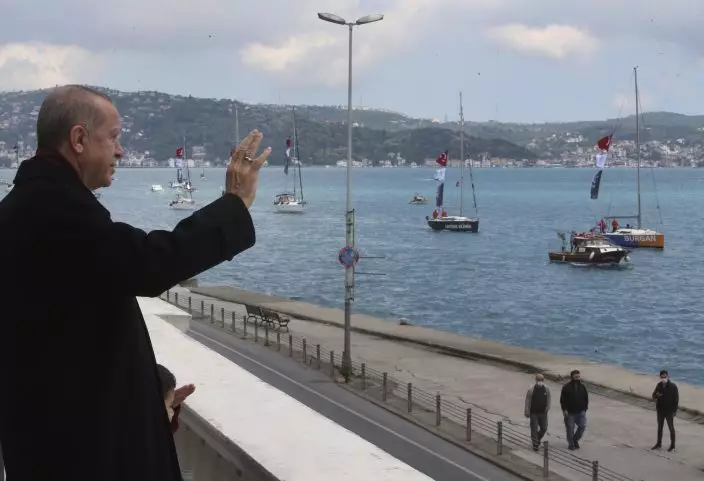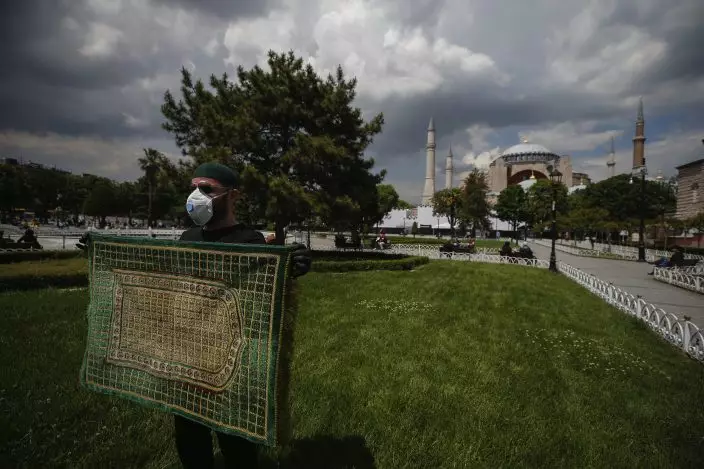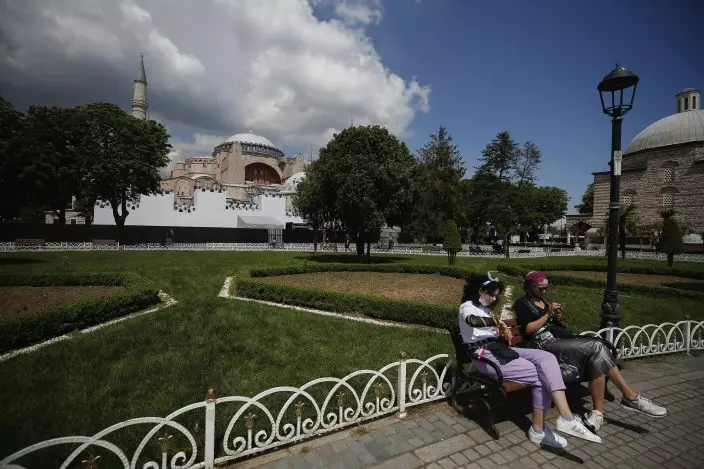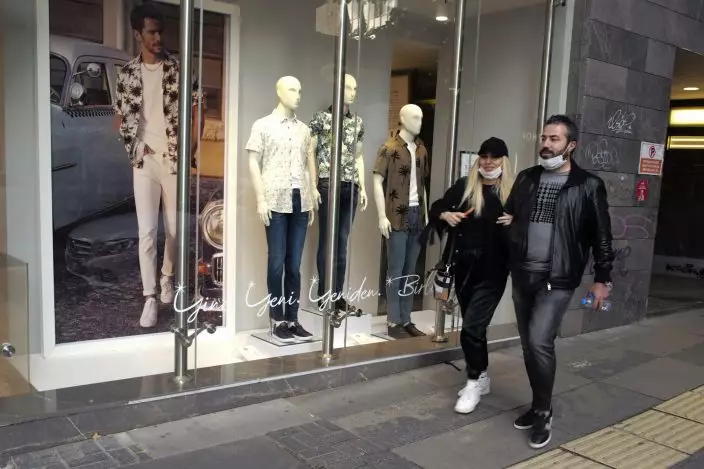Worshipers in Turkey have held their first communal Friday prayers in 74 days after the government reopened some mosques under an easing of pandemic restrictions.
Meanwhile, President Recep Tayyip Erdogan participated by video conference in events to mark the 567th anniversary of the Muslim conquest of Istanbul — then named Constantinople — by Ottoman Turks. The events included a controversial prayer recital inside the Hagia Sophia, built as a Byzantine cathedral in the 6th Century and now a museum and UNESCO World Heritage site.
The Friday prayers were held in the courtyards of selected mosques across the country, to minimize the risk of infection. Authorities distributed masks at the entrance, sprayed hand sanitizers, and checked temperatures. Worshipers were asked to bring their own prayer rugs, but some mosques offered disposable paper rugs placed 1.5 meters (5 feet) apart.

Turkey's President Recep Tayyip Erdogan salutes vessels decorated with Turkish flags as they sail the Bosporus Strait in Istanbul, part of the celebrations for the 567th anniversary of the Ottoman conquest of the city, then known as Constantinople, in 1453, on Friday, May 29, 2020. (Presidential Press Service via AP, Pool)
The move follows a slowdown in confirmed COVID-19 infections and deaths.
Later on Friday, a Muslim cleric recited the “prayer of conquest” from the Quran inside the Hagia Sophia, which was converted into a mosque in 1453.
The Muslim prayers at the Hagia Sophia are highly controversial, hitting at the heart of the country’s religious-secular divide.

A Muslim man prepares his prayer mat at the plaza, backdropped by a ''wall' set in front of Istanbul's 6th-century Hagia Sophia, the main cathedral of the Byzantine Empire which was converted into a mosque with the Ottoman conquest of the city, then known as Constantinople, in 1453, that was to be used as a set for the celebrations to mark the 567th anniversary of the conquest in Istanbul, Friday, May 29, 2020. A Muslim cleric recited the "prayer of conquest" from the Quran inside the Hagia Sophia. Muslim prayers at the UNESCO World Heritage site are highly controversial, hitting at the heart of the country's religious-secular divide. (AP PhotoEmrah Gurel)
In 1935, Mustafa Kemal Ataturk, the Turkish republic’s founder, converted the building into a museum that attracts millions of tourists, but some Islamic groups want it reconverted into a mosque. Erdogan, who leads an Islamic-oriented party and has himself recited prayers inside Hagia Sophia, has also spoken about the possibility of turning the domed complex back into a mosque.
Greece has in the past protested the use of Hagia Sophia, the former seat of the Greek Orthodox church, for religious purposes.
On Friday, Greek government spokesman Stelios Petsas criticized the prayer recital, saying “Hagia Sophia is a global monument of cultural heritage” that was being used as “a tool to promote other aims.“

People sit in the plaza backdropped by a ''wall' set in front of Istanbul's 6th-century Hagia Sophia, the main cathedral of the Byzantine Empire which was converted into a mosque with the Ottoman conquest of the city, then known as Constantinople, in 1453, that was to be used as a set for the celebrations to mark the 567th anniversary of the conquest in Istanbul, Friday, May 29, 2020. A Muslim cleric recited the "prayer of conquest" from the Quran inside the Hagia Sophia. Muslim prayers at the UNESCO World Heritage site are highly controversial, hitting at the heart of the country's religious-secular divide. (AP PhotoEmrah Gurel)
In a televised speech, Erdogan said it was important to mark the conquest with prayers inside Hagia Sophia.
The celebrations marking the conquest of the city kicked off with Erdogan saluting a flotilla of boats sailing past on the Bosporus waterway.
On Thursday, Erdogan announced plans to lift restrictions on movement between cities and reopen restaurants, cafes, sports centers, beaches and museums on June 1.

People wearing face masks for protection against the coronavirus, walk in a popular street hours before a two-day new curfew declared by the government in an attempt to control the spread of coronavirus, in Ankara, Turkey, Friday, May 29, 2020. The country has opted to impose short weekend and holiday curfews, instead of full lockdowns, fearing possible negative effects on the already troubled economy.(AP PhotoBurhan Ozbilici)
Turkey has reported more than 160,000 confirmed COVID-19 cases and a total of 4,489 deaths. The country ranks tenth in an international tally by Johns Hopkins University for the number of cases. Experts believe infections globally could be much more than reported.
Follow AP coverage of the pandemic at https://apnews.com/VirusOutbreak and https://apnews.com/UnderstandingtheOutbreak.


